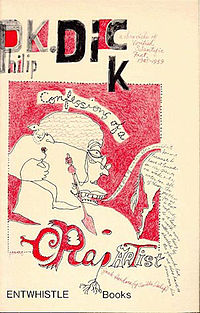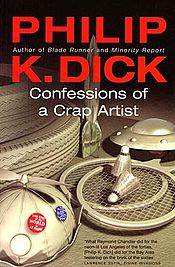- Confessions of a Crap Artist
-
Confessions of a Crap Artist 
Cover of first edition (paperback)Author(s) Philip K. Dick Country United States Language English Genre(s) Novel Publisher Entwhistle Books Publication date 1975 Media type Print (Hardcover & Paperback) Pages 171 pp ISBN ISBN 0-960-14282-7 (1978 Entwhistle paperback reissue) OCLC Number 4111677 Dewey Decimal 813/.5/4 LC Classification PZ4.D547 Co 1978 PS3554.I3  Cover to 2005 Gollancz Paperbacks edition of the book
Cover to 2005 Gollancz Paperbacks edition of the book
Confessions of a Crap Artist is a 1975 novel by Philip K. Dick, originally written in 1959. Dick wrote about a dozen non-science fiction novels in the period from 1948 to 1960; this is the only one published during his lifetime.
The novel chronicles a bitter and complex marital conflict in 1950s suburban California from the perspective of the wife's brother, an obsessive compulsive amateur scientist. The novel contains only small amounts of the complex mystical and science fiction concepts that define much of Dick’s work. Rolling Stone Magazine called it a “funny, horribly accurate look at life in California in the 1950s.”[citation needed]
Plot
The novel’s protagonist, the “crap artist” of the title, is Jack Isidore, a socially awkward tire regroover obsessed with amateur scientific inquiry since his teens. He catalogs old science magazines, collects worthless objects, and believes disproved theories, such as the notions that the Earth is hollow or that sunlight has weight.
Broke, Jack eventually moves in with his sister’s family in a luxurious farm house in suburban California. On the farm, Jack happily does housework and cares for livestock. He also joins a small apocalyptic religious group, which shares his belief in extra-sensory perception, telepathy and UFOs and believes the world will end on April 23, 1959. However, most of his time is dedicated to a meticulous “scientific journal” of life on the farm, including his sister’s marital difficulties.
Jack’s sister, Fay Hume, is a difficult and subtly controlling woman who makes miserable everyone close to her, especially her misogynist husband Charley. Fay has an extramarital affair with a young grad student named Nat Anteil while Charley is in a hospital recovering from a heart attack. After Jack reports this to Charley, the latter plots to kill Fay.
Charley kills Fay's animals and then commits suicide, realising that Fay has led him to do this. However, his will stipulates that Jack will inherit half the house, and Fay must buy her brother out, although Jack has used his half of the money to replace the slaughtered animals. Nat and his wife Gwen divorce, and Nat decides to stay with Fay. When the end of the world doesn't occur on the predicted date, Jack decides to seek psychiatric assistance.
Analysis
Jack feels compelled towards ideas and studies that those around him consider worthless. Although Dick never states directly that Jack is mentally ill, his behavior closely mirrors obsessive compulsive disorder and several characters suggest that he seek psychiatric help.
Despite his possible disorder, Jack is the most productive character in the novel. He runs both the farm and the household when Charley is in the hospital without sacrificing his scientific inquiries. At one point in the book, Jack is offered the opportunity to enter into the same comfortable, suburban lifestyle as his sister. Although circumstances prevent him from doing so, Jack’s meticulous nature allows him to go to impressive lengths to secure a job, and to confront difficult and complex financial and legal situations.
Fay and Charley, on the other hand, are wholly destructive characters. Throughout the novel, it is revealed, or at least implied, that each of them has concocted complex plans to emotionally destroy the other due to long-standing bitterness. They refuse to get a divorce both because of the social taboo against it and because each fears losing their luxurious home to the other. Neither shows much concern for their two children.
At the novel’s end, Jack concludes that his obsessions are healthier than those of his sister and his brother-in-law. However, the novel does not argue explicitly that Jack’s illness is acceptable, or not really an illness. In the end, he does accept suggestions that he requires psychiatric assistance, and finally obtains it.
Film adaptation
In 1992, French director Jérôme Boivin released Confessions d'un Barjo (Barjo for the English-language market), based on the novel. The film follows the novel fairly closely, although Jack (played by Hippolyte Girardot) is given the nickname “Barjo” (loosely translated as nutcase) and is referred to by that name throughout the film. Also, the story is shifted to contemporary France.
Works of Philip K. Dick Short story collections 1950sA Handful of Darkness (1955) · The Variable Man (1956)1960sThe Preserving Machine (1969)1970sThe Book of Philip K. Dick (1973) · The Best of Philip K. Dick (1977)1980sThe Golden Man (1980) · Robots, Androids, and Mechanical Oddities (1984) · I Hope I Shall Arrive Soon (1985) · The Collected Stories of Philip K. Dick (1987) · Beyond Lies the Wub (1988) · The Dark Haired Girl (1989) · The Father-Thing (1989) · Second Variety (1989)1990sThe Days of Perky Pat (1990) · The Little Black Box (1990) · The Short Happy Life of the Brown Oxford (1990) · We Can Remember It for You Wholesale (1990) · The Minority Report (1991) · Second Variety (1991) · The Eye of the Sibyl (1992) · The Philip K. Dick Reader (1997)2000sMinority Report (2002) · Selected Stories of Philip K. Dick (2002) · Paycheck (2004) · Vintage PKD (2006)Short stories 1950s"Beyond Lies the Wub" (1952) · "The Gun" (1952) · "The Skull" (1952) · "The Little Movement" (1952) · "The Defenders" (1953) · "Mr. Spaceship" (1953) · "Piper in the Woods" (1953) · "Roog" (1953) · "The Infinities" (1953) · "Second Variety" (1953) · "The World She Wanted" (1953) · "Colony" (1953) · "The Cookie Lady" (1953) · "Impostor" (1953) · "Martians Come in Clouds" (1953) · "Paycheck" (1953) · "The Preserving Machine" (1953) · "The Cosmic Poachers" (1953) · "Expendable" (1953) · "The Indefatigable Frog" (1953) · "The Commuter" (1953) · "Out in the Garden" (1953) · "The Great C" (1953) · "The King of the Elves" (1953) · "The Trouble with Bubbles" (1953) · "The Variable Man" (1953) · "The Impossible Planet" (1953) · "Planet for Transients" (1953) · "Some Kinds of Life" (1953) · "The Builder" (1953) · "The Hanging Stranger" (1953) · "Project: Earth" (1953) · "The Eyes Have It" (1953) · "Tony and the Beetles" (1953) · "Prize Ship" (1954) · "Beyond the Door" (1954) · "The Crystal Crypt" (1954) · "A Present for Pat" (1954) · "The Short Happy Life of the Brown Oxford" (1954) · "The Golden Man" (1954) · "James P. Crow" (1954) · "Prominent Author" (1954) · "Small Town" (1954) · "Survey Team" (1954) · "Sales Pitch" (1954) · "Time Pawn" (1954) · "Breakfast at Twilight" (1954) · "The Crawlers" (1954) · "Of Withered Apples" (1954) · "Exhibit Piece" (1954) · "Adjustment Team" (1954) · "Shell Game" (1954) · "Meddler" (1954) · "Souvenir" (1954) · "A World of Talent" (1954) · "The Last of the Masters" (1954) · "Progeny" (1954) · "Upon the Dull Earth" (1954) · "The Father-thing" (1954) · "Strange Eden" (1954) · "Jon's World" (1954) · "The Turning Wheel" (1954) · "Foster, You're Dead!" (1955) · "Human Is" (1955) · "War Veteran" (1955) · "Captive Market" (1955) · "Nanny" (1955) · "The Hood Maker" (1955) · "The Chromium Fence" (1955) · "Service Call" (1955) · "A Surface Raid" (1955) · "The Mold of Yancy" (1955) · "Autofac" (1955) · "Psi-man Heal My Child!" (1955) · "The Minority Report" (1956) · "To Serve the Master" (1956) · "Pay for the Printer" (1956) · "A Glass of Darkness" (1956) · "The Unreconstructed M" (1957) · "Misadjustment" (1957) · "Null-O" (1958) · "Explorers We" (1959) · "Recall Mechanism" (1959) · "Fair Game" (1959) · "War Game" (1959)1960s"All We Marsmen" (1963) · "Stand-by" (1963) · "What'll We Do with Ragland Park?" (1963) · "The Days of Perky Pat" (1963) · "If There Were No Benny Cemoli" (1963) · "Waterspider" (1964) · "Novelty Act" (1964) · "Oh, to Be a Blobel!" (1964) · "The War with the Fnools" (1964) · "What the Dead Men Say" (1964) · "Orpheus with Clay Feet" (1964) · "Cantata 140" (1964) · "A Game of Unchance" (1964) · "The Little Black Box" (1964) · "Precious Artifact" (1964) · "The Unteleported Man" (1964) · "Retreat Syndrome" (1965) · "Project Plowshare" (1965) · "We Can Remember It for You Wholesale" (1966) · "Holy Quarrel" (1966) · "Your Appointment Will Be Yesterday" (1966) · "Return Match" (1967) · "Faith of Our Fathers" (1967) · "Not by Its Cover" (1968) · "The Story to End All Stories" (1968) · "The Electric Ant" (1969) · "A. Lincoln, Simulacrum" (1969)1970s"The Pre-persons" (1974) · "A Little Something for Us Tempunauts" (1974) · "The Exit Door Leads In" (1979)1980s"Chains of Air, Web of Aethyr" (1980) · "Rautavaara's Case" (1980) · "I Hope I Shall Arrive Soon" (1980) · "The Alien Mind" (1981) · "Strange Memories of Death" (1984) · "Cadbury, the Beaver Who Lacked" (1987) · "The Day Mr. Computer Fell Out of Its Tree" (1987) · "The Eye of the Sibyl" (1987) · "Stability" (1987) · "Goodbye, Vincent" (1988)Film and television adaptations 1980sBlade Runner (1982)1990sTotal Recall (1990) · Confessions d'un Barjo (1992) · Screamers (1995) · Total Recall 2070 (1999 TV series)2000sImpostor (2002) · Minority Report (2002) · Paycheck (2003) · A Scanner Darkly (2006) · Next (2007) · Screamers: The Hunting (2009)2010sRadio Free Albemuth (2011) · The Adjustment Bureau (2011) · Total Recall (2012) · King of the Elves (2013)Categories:- 1975 novels
- Novels by Philip K. Dick
- American novels adapted into films
- 1950s in fiction
- Novels set in California
Wikimedia Foundation. 2010.
